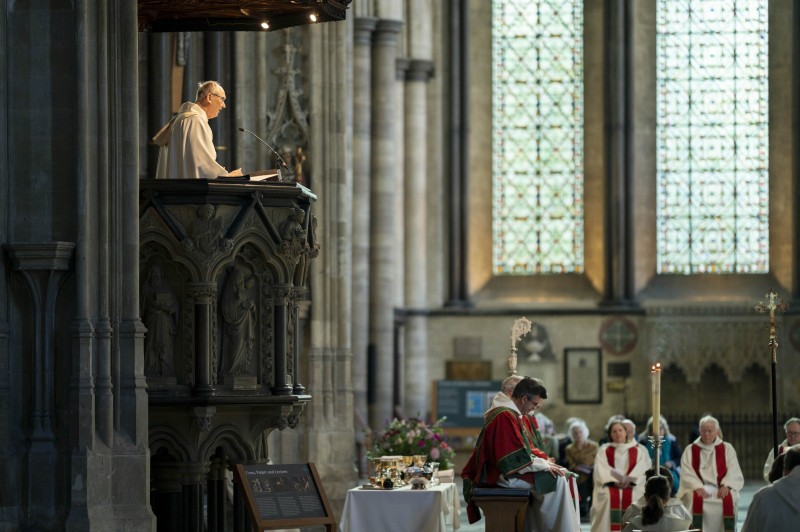
Transcript of the homily by The Rt Revd John Klassen, Abbot of Saint John’s Abbey
Salisbury Cathedral, 5 November 2023
When I was a young monk studying theology toward ordination
I had the opportunity to spend the spring of 1975 in Jerusalem.
One of our explorations took us to the Western wall of the Temple Mount
and our expert tour guide was able to show us the huge blocks of the temple built during Herod’s reign:
two feet high, three feet wide and fourteen to sixteen feet long, all tumbled across each other.
It is no wonder that the disciples are shocked to hear the prophecy of Jesus –
that not one of these stones will remain standing on the other. They are thinking – if that can happen, what will happen to us?
The scriptures, both in the Old Testament prophets and the New Testament,
have many vivid portrayals of the end times.
As a teacher and prophet Jesus both receives and hands on some of this tradition.
Readings
1 Thess. 2.9-13
Psalm 43
Matthew 24 (1-14)
Nation will arise against nation
kingdom against kingdom.
There will be famines and earthquakes.
There will be persecutions and a lot of hatred.
Let’s throw in a pandemic while we are at it!
I could not help but think of the opening lines of W.B. Yeats’s poem, The Second Coming:
Turning and turning in the widening gyre
The falcon cannot hear the falconer;
Things fall apart; the centre cannot hold;
Mere anarchy is loosed upon the world,
The blood-dimmed tide is loosed, and everywhere
The ceremony of innocence is drowned;
The best lack all conviction, while the worst
Are full of passionate intensity.
This is a grim picture drawn by both the poet Yeats, and by other prophets like Joel or Jeremiah, or Jesus.
Perhaps we realise that our social and political structures are precarious.
They cannot survive on their own resources.
While the message of apocalypse is frightening,
both the message that comes from our real situation and from the Gospel passage,
Jesus also gives us some teaching that steadies our shaky knees and gives us encouragement.
Before the advent of social media, Jesus tells us:
Many will come and say, “I am the Messiah, I will save you.”
You will hear all kinds of reports of wars,
disturbing behavior,
one more outrageous than the next.
Do not be alarmed. Above all do not let those reports shake your confidence in God.
The Latin basis of the word “precarious” indicates that it depends on prayer for its survival.
Truly, we are in need of God’s help.
Making intercession for all is an expression of our sense of solidarity with those who are close to us,
and those who are far away.
We pray that God’s Kingdom will come and that
we will persevere to the end, as Jesus urges us to.
To do so requires resilience.
Resilience has its original meaning from engineering,
where it means the ability of a system to absorb change and disturbances in the environment and to still function.
Some synonyms for it are elasticity, pliability, suppleness, spring.
In a social environment, resilience is oriented toward persons:
resilience is the will and ability to anticipate, endure, adapt,
respond and thrive within a disruptive and changing environment.
I think you can see how important it is for families,
spouses, communities, churches,
to adapt, to respond in creative ways in alignment with a larger purpose, with the Gospel for our guide.
So, some practices for resilience:
Praying the psalms, slowly, reflectively, and being in silence are enormously restorative to sanity and well being.
Being present to God, letting God in.
This may seem really monkish but
prayer and the practice of silence are truly regenerative.
How could it not be so, being embraced by the source of all Being?
Another pathway toward resilience is service:
to the poor, the hungry, those who are physically challenged,
those who live alone and are home-bound.
These are examples of practical charity,
love made real in our awareness of the needs of others.
Individuals in these situations
pull us out of global abstractions into the human framework.
Service to others pulls us back
from the ledge of catastrophic thinking.
In short, Jesus warns his disciples and us to not be caught off guard by our own times.
At the same time, Jesus urges us not to lose faith in God’s saving care,
to be shaken into non-action.
We should never lose sight of the spiritual clarity
that comes from integrity.
Time and again in the past ten years
I have seen and admired ordinary people acting with integrity
and courage in extremely difficult situations.
They were going about their jobs,
in the face of much uncertainty, with searching moral purpose
and in that I found hope.
It is a light for all of us.
Thank you for the honour of being able to speak to you about the scripture today.
Photos by Peter Langdown Photography

Leave a Reply